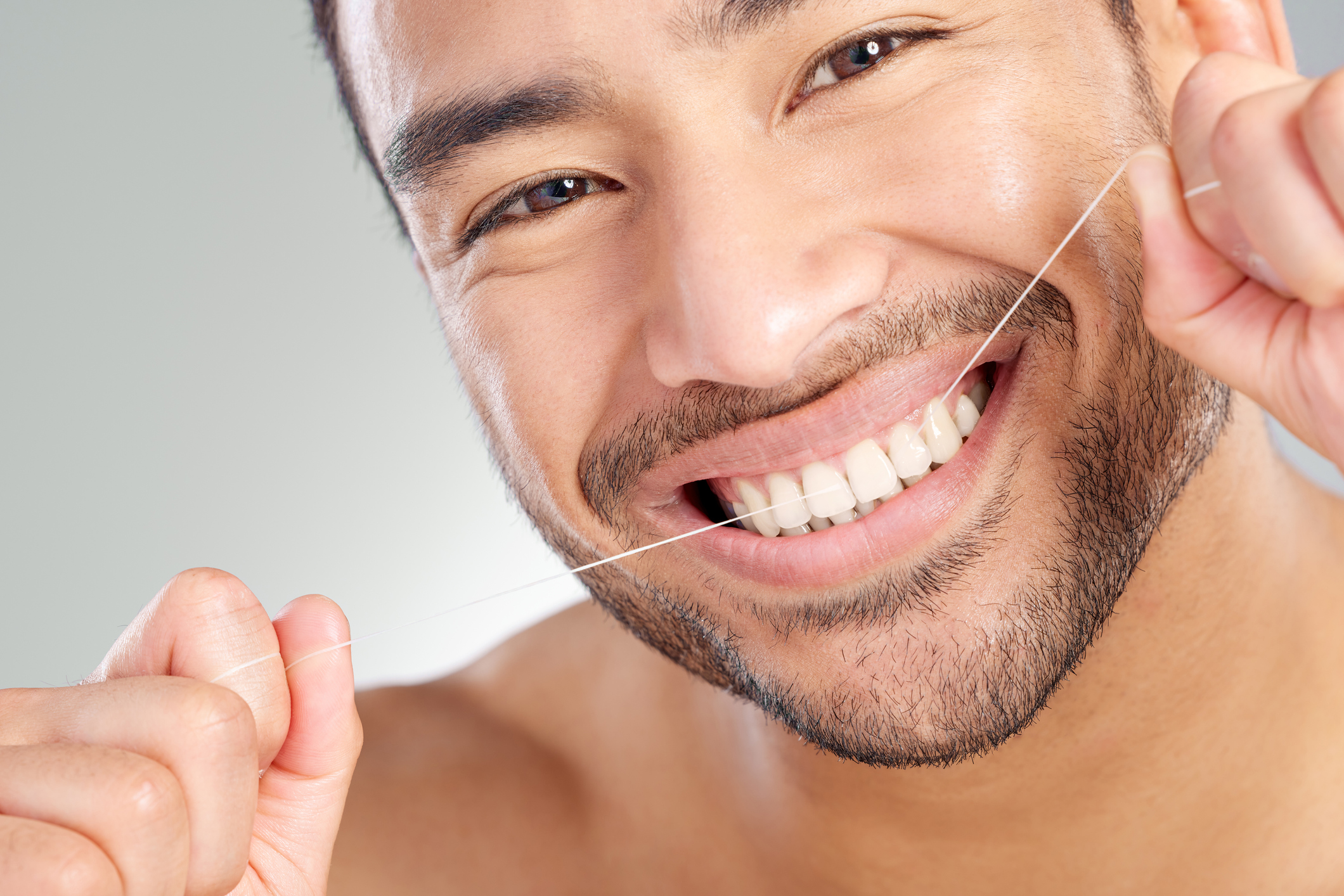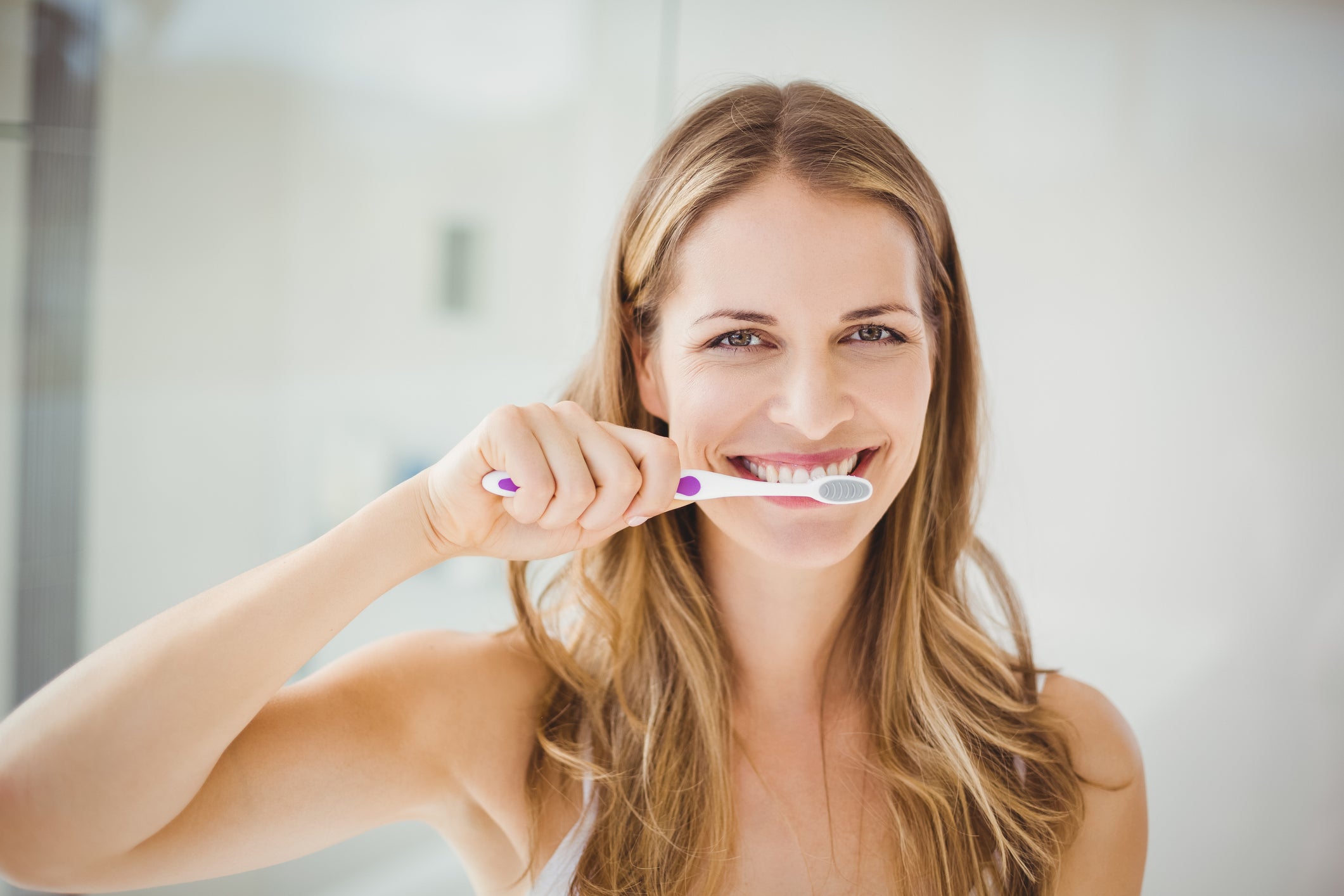-
Five Big Ways to Improve Your Dental Health in 2024

Getting healthier teeth in 2024.
Your smile is the first thing people see when they meet you! First impressions are important so here are some ways to improve that smile. Follow these tips and you will be the one who sparkles when you walk in the room.
1.Practice Good Oral Hygiene
Seems like a no brainer, but there are many details in your brushing routine that you could be doing wrong.
- Brush at least twice a day -Brushing regularly is key. Make sure you are cleaning those pearly whites more than once a day.
- Labels-First check your label and make sure that your toothpaste has fluoride in it. Fluoride is very important for keeping teeth strong. It can actually work through remineralization which is the regrowth of a partially decayed tooth.
- Floss-Brushing your teeth doesn’t complete the job. Make sure you floss, too!
2. Please do not use Tobacco and Limit Alcohol
Tobacco is so last century. If you smoke, please quit. All tobacco use is absolutely terrible for your dental health.
If you drink, try to limit your alcohol to occasional usage. Alcohol can have a major impact on your dental health. Alcohol consumption can increase bacteria and cause tooth decay. It’s also full of sugar. So this New Year, 2024, dentists recommend cutting your alcohol consumption in half.
3. Stay Hydrated
Studies show that staying hydrated is a great way to improve your breath. It helps with saliva production as well. Good hydration can even help remove bacteria or bits of food that could be lingering after a meal if you haven’t had time to brush.
4. Eat Healthy Food
Not only do those crunchy, delicious fruits and veggies help clean your teeth, they also provide essential nutrients for a healthy smile. From apples and carrots to eggs and milk, all of these healthy dietary choices are key in giving you that healthy smile by providing the vitamins and minerals you need.
Ask your dental healthcare provider for more tips on foods with great nutrients for good dental health. There are delicious options out there!
5. Schedule Routine Dental Check-Ups
The best way to stay on top of things in 2024 is to get it all scheduled. Get those dental visits in your planner! If you want to make sure your dental health is the best it can be, make sure you are seeing your dentist regularly throughout the new year! This means every six months.
Wishing you all the best and especially a gorgeous and healthy smile in 2024!
Park 56 Dental
Interested in chatting more about how to improve your dental health in 2024? Park 56 Dental is the way to go! Voted #1 in New York City, the dentists at Park 56 Dental have the answers! Park 56 Dental is known for great dentistry. We provide the best treatments in town from pediatric dentistry to endodontics, oral surgery to prosthodontics, emergency to sedation dentistry. You and your family can count on us to make you feel welcome and comfortable at each visit! Be sure to visit our website or if you’d like to make an appointment, click here to book online or call (646) 679-3989.
-
Vitamins and Minerals for Good Dental Health

Man eating healthy food for healthy teeth.
A healthy diet can provide you with good resources for building healthy teeth and having healthy gums. We all know that avoiding sweets and starch is good for your teeth, but it doesn’t end there. Many foods can also provide you with bone building nutrients for your body so that your teeth will be healthy and strong.
Why are Vitamins and Minerals Important for Teeth?
All the organ systems in the body require nutrients to thrive. Each organ system requires a certain type of vitamins and minerals to perform the action required of them. The mouth, teeth and gums are no different. They also require specific nutrients in order to function properly. Here are some of the vitamins and minerals needed for a healthy mouth and the foods you can eat to add these nutrients to your diet.
Here are some vitamins and minerals that can really help with great dental health!
Calcium
Most of us know that calcium is good for our bones. It’s good for our teeth, too. Calcium is essential in bone health, and it is crucial in strengthening your tooth’s enamel. If you’re curious about how to get calcium into your system, you can get it through milk, cheese, yogurt, and eggs. If you don’t do dairy, you can obtain calcium through almonds, salmon, broccoli, Bok choy, kale, collard greens, and turnips. Make sure not to overcook these veggies, so they continue to hold their nutrients.
Vitamin C
Known for being good for the immune system, vitamin C is also essential for the teeth. It assists in the absorption of calcium and helps protect the cells which produce dentin, the inner layer of the tooth. Vitamin C is also essential for the health of connective tissues, which includes the gums. Vitamin C is readily available in many kinds of foods like citrus fruits, broccoli, leafy greens, and potatoes.
Phosphorus
Whole grains, milk, eggs, fish, and other protein-rich foods are the best ways to get this eesential vitamin into your diet and get on your way to a healthy smile. Phosphorus assists the body in absorbing calcium and helps to strengthen teeth by protecting tooth enamel. A supplement is usually not needed to get this nutrient in your diet. Most of us get plenty of it!
Vitamin D
Grab that glass of milk! You’ll want to get the one food most fortified with vitamin d if you want to flash those pearly whites with confidence. A deficiency in vitamin D can cause many oral health issues including gingivitis, gum disease and cavities. If milk isn’t for you, many foods contain vitamin D, including salmon, canned tuna, and mushrooms. And other foods such as cereal and orange juice are also fortified with this important nutrient.
Vitamin A
This nutrient helps you produce saliva which is important for breaking down food and bacteria, keeping those chompers nice and clean. Vitamin A is found in many dietary choices, including fruits, veggies, fish, and eggs.
What About Supplements?
If you or your dentist think that your diet doesn’t contain enough of the nutrients you need for a healthy smile, there are many supplements available that can help you access what you need! If you have concerns, consult with your dentist or physician about supplements you can take to complete your nutrient needs.
Now that you know how to build that healthy smile, it’s a great time to grab a nutrient packed snack!
Park 56 Dental
Have questions about the vitamins and mineral that can help you with your dental health? Park 56 is here to help! Voted #1 in New York City, the dentists at Park 56 Dental have the answers! Park 56 Dental is known for great dentistry. We provide the best treatments in town from pediatric dentistry to endodontics, oral surgery to prosthodontics, emergency to sedation dentistry. You and your family can count on us to make you feel welcome and comfortable at each visit! Be sure to visit our website or if you’d like to make an appointment, click here to book online or call (646) 679-3989.
-
The Best and Worst Foods to Eat for your Teeth During the 2023 Holidays

Enjoying Christmas dinner.
The Holidays are upon us, and it’s time to celebrate in style. But when the new year comes, we want to make sure our smiles are still gorgeous and healthy. Here is a list of some of the nicest and naughtiest foods you can choose at the holiday buffet!
Savory Selections
If you’re looking for something delicious and filling, but not looking to break the bank on dental bills, let’s find you some yummy options!
The Nice
- Nuts-These are a great, filling snack that provide a satisfying crunch, but also key nutrients such as calcium and protein.
- Cheese-Full of calcium, this is a snack you can find at almost any buffet table and it won’t let you down in the dental health area. Cheese also is an acid neutralizer in the mouth which reduces your risk of cavities.
- Meats-turkey, ham, and others can be great ways to get phosphorus and potassium. Both are very helpful in the absorption of calcium which builds strong teeth
- Raw Veggies-this may seem obvious, but in addition to being good for your body, ingesting them is great news for your teeth as well. They’re loaded with vitamin C, vitamin A and others.
The Naughty
- Popcorn-Sorry, but the husks of popcorn are really quite damaging to teeth and gums.
- White Wine-When in doubt, opt for red. Red wine helps get rid of bad bacteria in the mouth, whereas white wine is extremely acidic and can actually erode the enamel of the tooth.
Sweet Treats
Walking into that party with a sweet tooth is a dangerous endeavor, but we can help you find some treats that won’t leave you with a toothache and a less than sweet smile.
The Nice
- Fresh Fruit-If you’re looking to satisfy that sweet tooth, fresh fruit is the way to go. It’s got tons of nutrients and can help you fill up on vitamins and minerals while hydrating yourself naturally!
The Naughty
- Candy-This may be obvious, but there is no nutritional value whatsoever, and the candy will stick in your teeth and can even chip away at the enamel while you eat it. Stay away.
- Cookies and other Sugary Baked Goods-The amount of sugar in these treats is extremely high and when that sugar mixes with the bacteria in your mouth, your teeth are in for some trouble. Try to limit consumption of these goodies and try to brush or floss shortly after you eat them.
- Dried Fruit-It seems nice, but it’s actually naughty. Dried fruit can have a very high sugar content and can stick in your teeth. Not a great choice.
Remember during the Holidays to continue maintaining your great oral hygiene regimen so that you can keep that smile sparkling well into the new year!
Park 56 Dental
If it’s been a minute since your last dental checkup and you’re looking for a comfortable, spa-like environment, look no further than Park 56 Dental! Voted #1 in New York City, the dentists at Park 56 Dental have the answers! Park 56 Dental is known for great dentistry. We provide the best treatments in town from pediatric dentistry to endodontics, oral surgery to prosthodontics, emergency to sedation dentistry. You and your family can count on us to make you feel welcome and comfortable at each visit! Be sure to visit our website or if you’d like to make an appointment, click here to book online or call (646) 679-3989.
-
How Fluoride helps to prevent Tooth Decay

Fluoride helps keep her smile clean, fresh, and strong.
What is Fluoride?
Fluoride is a naturally occurring mineral. It is an element and has been found to protect teeth from tooth decay. Fluoride can be found in the water supply, but it is also found in many foods such as oatmeal, raisins, shellfish, potatoes and others.
How are Cavities Formed?
We all have bacteria living in our mouths. The bacteria feeds on sugars from foods that we eat. When that happens, the bacteria secrete an acid that can cause teeth to decay. That decay of the enamel can have serious consequences, including cavities and even loss of the tooth. The decay of the tooth is called demineralization.
How Does Fluoride Work?
Nature’s Cavity Fighter-Fluoride is a naturally occurring mineral. With a healthy diet and regularly healthy habits it can be used to help prevent tooth decay. It works to build tooth enamel so that teeth are less susceptible to decay because they’re stronger.
Fluoride also repairs tooth enamel after decay has begun. This repair process is called remineralization.
Fluoride Has Been Proven Safe and Effective
Studies have shown that fluoride added to water supplies is extremely beneficial when it comes to cavity prevention. For over 70 years, communities have been adjusting fluoride levels and there is extensive proof that fluoridated water is very effective in the prevention of tooth decay. How is fluoride added to the water supply? Fluoride is already present in the water supply. Most communities adjust the amount of fluoride in the water so that it’s at a safe level but is also effective in the remineralization of tooth enamel.
How Can You Work Fluoride into your Routine?
- Fluoridate toothpaste
Even children as young as age 3 can begin using a fluoridated toothpaste, as long as a small amount is given on the toothbrush. For adults, brushing twice daily with a fluoridated toothbrush will be effective in cavity prevention.
- Fluoridated mouthwash
Mouthwash that contains fluoride has been proven effective in the treatment of cavities. However, it is not recommended to give mouthwash to small children. Fluoride treatment as administered by a dentist, is available to people who are at high risk for tooth decay. This includes people who have poor dental hygiene, those who live in communities with low fluorine levels in the water supply.
- Fluoride in food
Fluoride can be found in many foods, too. This kind of fluoride is called systemic fluoride. Some foods that contain fluoride are grapes, apples, strawberries, grapes, spinach, potatoes, veggies, seafood, tea, coffee, and many more.
Ask your dentist for more information about getting enough fluoride into your routine.
Park 56 Dental
Have questions about fluoride, fluoride treatments, or the best way to get fluoride into your routine? Voted #1 in New York City, the dentists at Park 56 Dental have the answers! Park 56 Dental is known for great dentistry. We provide the best treatments in town from pediatric dentistry to endodontics, oral surgery to prosthodontics, emergency to sedation dentistry. You and your family can count on us to make you feel welcome and comfortable at each visit! Be sure to visit our website or if you’d like to make an appointment, click here to book online or call (646) 679-3989.
-
Tips and Advice for Flossing in Recognition of National Flossing Day

Man taking care of teeth by making sure to floss.
National Flossing Day is right around the corner, and whereas it might be slightly overshadowed by Thanksgiving and Native American Heritage Day, it’s still a great time to give three cheers for the unsung hero of dental hygiene, the modest waxed string we know as dental floss.
Why Should You Floss?
Most of the daily emphasis on toothcare is on brushing, which removes bacteria, food, and grime from the surface of the teeth. But where flossing truly shines is in getting into those hard-to-reach spaces in between teeth and close to the gum line, where regular toothbrushes can’t reach. Flossing helps fight gingivitis and periodontitis, reducing the risk of gum inflammation and cavities. Flossing also helps promote fresh breath by removing the food and bacteria that collects between your teeth.
Tips for Effective Flossing
- Choose the Right Floss:
- There are various types of dental floss available, including waxed, unwaxed, flavored, and wider tape-style floss. Choose the one that feels most comfortable and effective for you.
- Establish a Routine:
Make flossing a daily habit. Aim to floss at least once a day, ideally before bedtime, to remove accumulated plaque and food particles.
- Proper Technique:
-
- Start with an 18-inch (45 cm) length of floss. Wind most of it around one finger on each hand, leaving about 1-2 inches (2-5 cm) of floss to work with.
-
- Gently slide the floss between your teeth using a sawing motion. Avoid snapping it into place, which can harm your gums.
-
- Curve the floss around the base of each tooth, forming a C-shape, and gently glide it up and down. Be gentle to avoid damaging your gums.
-
- Use a fresh section of floss for each tooth to avoid transferring bacteria.
- Be Patient:
-
- Take your time when flossing to ensure thorough cleaning. Rushing can lead to incomplete removal of plaque and debris.
- Keep Flossing Agents Handy:
- Keep floss in your purse, briefcase, backpack or satchel. Floss picks are also a convenient minimal device for a quick cleaning when out and about.
- Use Flossing Aids:
-
- If traditional flossing is challenging, consider using floss picks, interdental brushes, or water flossers. These tools can make the process more accessible and convenient.
- Teach Children Early:
-
- Encourage good oral hygiene habits in children by teaching them to floss as soon as part of your family culture. Child-friendly floss and flossers are available.
- Avoid “Bleeding Gums” as an Excuse:
-
- If your gums bleed when you first start flossing or after a break, don’t be discouraged. This is a sign of gum inflammation and indicates the need for regular flossing to improve gum health.
- Set Reminders:
-
- Use phone alarms or other reminders to ensure you don’t forget to floss daily, especially if you’re establishing a new habit.
Call Park 56 Dentistry to Celebrate
Our dental professionals are always available to celebrate National Flossing Day with you, to help you analyze your flossing technique, or to offer advice on the best type of floss for you. November is also a great time to contact us and schedule your end-of-year cleaning or get on the schedule after the new year.
-
How to Maintain Good Oral Hygiene During the Holidays

Couple traveling for the Holidays.
The holiday season surrounds us all with friends and family, as well as delicious food and drink, seemingly around the clock! Turkeys, cookies, hams, pies, briskets, latkes, cheese plates, dumplings…not to mention the special toasts to the season of every shade. It can be challenging to maintain dental health with all these sumptuous challenges on every side, but Park 56 Dentistry can you navigate the holiday season with oral hygiene in mind. Here are our top tips.
- Keep Flossers Handy
Simple, inexpensive, and discrete, pocket flosser picks are the ideal solution for holiday parties, whether you’re hosting or spending a few hours at the office, the neighbors, a family party, or going out with friends. Stash a few in your favorite jacket, purse, or wallet, so you never have to have that less-than-fresh feeling in the midst of a celebration.
- Limit Your Exposure to Key Types of Food
It’s easier said than done, I know, but if you want to avoid dental damage, then you might want to limit your enjoyment of various kinds of foods, or at least know how best to enjoy them without damaging your teeth. These include:
- Sugary Foods: Sugar increases bacterial activity in your mouth, so be prepared to brush often if you have a hankering for sweets.
- Hard Foods: Think candy canes, nuts, and ice. Let the candies and ice melt in your mouth instead of using your teeth to crunch them up. Enjoy the roasted nuts, but don’t overdo it. It might seem like a good idea at the time, but these dense treats can take a toll on your teeth, eroding them and potentially causing cracks or chips.
- Dark Beverages: Red wine, coffee, hot cocoa, and cosmos are all delights of the season, but they can darken your teeth as well. If a whitened smile is important to you, then think before you drink and select light-colored or clear beverages.
- Chew Sugar-Free Gum
In addition to giving you a break from snacking and freshening your breath, a stick of gum can inspire your salivary glands to help out cleaning your mouth. Saliva neutralizes acids and helps purge bacteria from your mouth and teeth.
- Nibble Some Cheese
Although it might not be the best choice for your waistline during a period of the year known for fattening treats, noshing on bites of cheese in between sips of acidic beverages like soda and wine can raise the pH level of your mouth and prevent your teeth from suffering acidic enamel damage.
- Stay Hydrated
There are many reasons why it’s a good idea to refill your cup with water in between other types of beverages, but one of these is that water helps clean your mouth of food and bacteria, as well as keeping you feeling your best.
The holiday season doesn’t have to sideline your dental health awareness. By following these tips, you can make sure you enter your new year without the regrets of cavities, stained teeth or dental injury. While you’re thinking about it, contact Park 56 Dentistry to schedule your winter cleanings before and after the holidays, and keep your smile vibrant.
-
Why Regular Dental Check-Ups are Essential for a Healthy Smile

Patient getting dental check-up.
Maintaining a beautiful and healthy smile begins with your daily dental routines of brushing and flossing. Yet even the most thorough approach to oral hygiene also requires frequent dental check-ups. Here’s why:
- Early Detection of Dental Issues
Even if nothing seems out of the ordinary, dental problems can sometimes develop without any noticeable symptoms in their early stages. Regular checkups can give your dentist the chance to identify cavities, gum disease and oral cancer at early stages, which can make them more manageable.
- Professional Cleaning
Brushing and flossing alone can’t remove all plaque and tartar buildup. Your dentists at Park 56 can perform thorough cleanings to remove these deposits, helping to reduce the risk of cavities and gum disease.
- Oral Hygiene Education
You may need personalized advice on improving your oral hygiene regimen. Your dentist and hygienist can assess the work you do at home and provide you with tips on how to improve your brushing and flossing techniques. They might also recommend new products or technologies that could be beneficial for your specific needs.
- X-rays and Diagnostic Tools
Special diagnostic equipment can help shine a light on things that you might not be able to detect at home. Hidden cavities, impacted teeth, or bone loss might be lurking out of sight, but regular annual X-rays can give you an inside look to be able to diagnose and repair an issue before it becomes a serious problem.
- Gum Health Assessment
Gum health is an indicator of overall dental health. Early screening and detection of gum disease can provide you with treatment necessary to prevent tooth loss and other problems. Your dentists at Park 56 can assess your gums and help treat or prevent gum disease before it starts.
- Preventing Complications
Regular dental analysis can keep your medical records up to date on your past issue, ensuring that your treatment plan is current and effective. This can give your dental team the opportunity to monitor your progress and maintain a treatment plan that can lead to total wellness and save you time and money on more extensive remedies.
- Oral Cancer Prevention
Your dentist is trained to detect the early signs of oral cancers during routine exams. Anyone can become susceptible to mouth cancers but patients who smoke tobacco or drink alcohol are especially at risk. Early detection can make treatment easier and less invasive, significantly improving chances of successful treatment.
- The Personal Touch
Your dental team at Park 56 take a personal approach to every patient. We take the time to get to know you, your dental history, your lifestyle and your unique needs. Whether you need a simple cleaning, a filling, oral surgery, prosthodontics, sedation dentistry, endodontics, or Invisalign, our dental specialists can customize an immediate and ongoing treatment plan to fit your needs.
Regular dental screenings are essential to your overall oral hygiene plan, and the experts at Park 56 can help you make sure you are staying on track and maintaining your dental health. Give us a call and schedule your next appointment today so you can keep your smile shining bright.
-
The Link Between Oral Health and Overall Well-Being

Woman caring for her dental health.
Good dental hygiene provides an extra boost of confidence. It’s easy to smile and share in conversations when you know your teeth are at their best. But aesthetics isn’t the only reason that you should be keen on keeping your mouth spic and span. Your overall wellness can depend on good dental routine, along with regular checkups and cleanings at your dentist. Let’s look at some of the different ways a healthy mouth can help you live a better life.
A Stitch in Time
Maintaining good dental hygiene practices, such as daily brushing and flossing, combined with regular dental checkups, can help you avoid issues such as cavities, gum disease and tooth decay. Left unchecked, these conditions can worsen to discomfort, infection, and tooth loss. Taking a proactive approach to your dental routine is the best way to stop problems before they can start.
Good For the Wallet
Fixing a serious dental problem is much more expensive than preventing the problem in the first place. The average root canal can cost anywhere from $700 to upwards of $2,000, depending on the tooth location. Dentures or dental implants cost even more. You can save yourself a headache, and a toothache, by proactively engaging in good dental hygiene.
For Your Health
Bad dental hygiene has been linked to serious health problems. Mouths are full of various types of bacteria, most of them harmless. But bacterial buildup from gum disease can contribute to bacteria entering the bloodstream and causing endocarditis, an infection of the inner lining of the heart’s chambers and valves. There is also a link between cardiovascular disease and gum disease, though scientists do not yet fully understand the connection. Inhaling the excess bacteria resulting from poor dental hygiene can even lead to respiratory disease and pneumonia.
Communication Matters
Your smile isn’t just for show; it’s an essential tool for communication. Dental problems like missing teeth can affect the way you talk, potentially causing confusion and eroding your social confidence. Maintaining proper oral health can help ensure your message stays on track.
Mental Health
Experiencing pain in your mouth is more than just an inconvenience. Dental problems can cause psychological issues and result in lower feelings of self-worth. On the other hand, a healthy smile can boost your confidence and increase your overall happiness.
Looking Out for Baby
For expectant mothers, oral health during pregnancy is crucial. Poor oral health has been associated with preterm birth and low birth weight. Hormonal changes during pregnancy can make women more susceptible to dental issues, underscoring the importance of dental care during this critical time.
The link between good oral health and overall well-being is undeniable. It’s not just about a dazzling smile; it’s about your physical, mental, financial, and emotional health. Park 56 Dental is here to be your partner in dental wellness. Voted NYC’s best dentist, we specialize in pediatric, prosthodontics, endodontics, oral surgery, Invisalign®, emergency, and sedation dentistry. Don’t skip those dental appointments. Keep up with your daily oral hygiene routine and address any oral health concerns promptly. Your smile reflects your overall well-being, so let us help you make it a healthy one.
-
How Chronic Illnesses Can Affect Oral Health
 Woman taking care of dental health by brushing teeth.
Woman taking care of dental health by brushing teeth.Oral Health and Overall Health
Did you know that the health of your mouth and the overall health of your body are connected? In fact, there is a bidirectional relationship between chronic illness and oral health. Some chronic diseases are directly associated with oral health issues, either causing or being caused by them. In other cases, there’s an indirect relationship, or shared risk factors. Let’s take a look at how chronic illnesses can affect oral health.
Chronic Diseases are Leading Causes of Death and Disability
Conditions like diabetes, heart disease, respiratory disease, cancers, and obesity can all be linked with poor oral health. Because oral health conditions are often chronic, they can happen alongside other chronic conditions. Unfortunately, people with more than one chronic condition tend to have worse long-term health outcomes than those who only have one chronic condition. Prevention is the key to good health, and maintaining good oral health care can help prevent chronic diseases or improve the outcome for those who suffer from them.
Preventing Gum Disease Can Improve Health
Gum disease is very common, affecting about 75 percent of adults in the United States. If left untreated, gum disease can advance and increase the risk of serious health issues, like diabetes, heart disease/stroke, lupus, oral cancer, organ transplant, and rheumatoid arthritis. Fortunately, when detected early, gum disease can be reversed through good oral hygiene and regular dental care.
How Different Conditions are Connected
- Diabetes, periodontal disease, and tooth decay are interconnected. Though more research is needed, there is evidence to suggest that periodontal disease and tooth decay can exacerbate type 2 and gestational diabetes. This probably occurs because these conditions increase inflammation and blood sugar levels. By the same token, people who have diabetes are at higher risk of infections that can cause tooth decay and periodontal disease.
- Oral health issues may be associated with heart disease. Studies show that periodontal disease and tooth decay may increase a person’s risk of heart disease, or worsen existing heart conditions, by causing inflammation and damaging blood vessels.
- Tooth decay and periodontal disease may be associated with respiratory disease. There are studies that suggest that by causing an increase in bacteria, periodontal disease and tooth decay can increase the risk of respiratory conditions, including emphysema, pneumonia, and COPD, due to bacteria from the mouth colonizing in the respiratory tract. People at highest risk include older people, those who wear dentures, and people with decreased immune system function.
- Periodontal disease and tooth decay may be linked to some cancers. Even after controlling for other risk factors, like smoking and diet, there is evidence to suggest that oral health problems may be connected to cancers like lung, pancreatic, and head/neck cancers. In one study, a 35 percent increased risk for blood cancer and 21 percent increased risk for cancer in general for men with periodontal disease, and another suggests that there is also a 63 percent increased risk of pancreatic cancer. Still another study suggests a 43 percent higher risk of esophageal cancer and a 52 percent higher risk of stomach cancer for those with periodontal disease, as compared to people with healthy gums.
- Obesity may increase the risk of oral health issues. The result of preliminary research on obesity and oral health speculates that secretions from adipose tissue increase the risk of inflammation, decreasing immunity as well as blood flow to the gums.
Talk to Your Dentist About Your Medications
Sometimes, the drugs prescribed for chronic illnesses can cause side effects that impact their oral health. For instance, swollen and bleeding gums, along with dry mouth can be side effects of medications for hypertension and heart conditions. Some drugs for high blood pressure can cause gum overgrowth, which can lead to decay and progressive gum disease. Because inflamed gums bleed easily, there is also a risk for ulceration and soreness. Other medications for hypertension can reduce saliva production, putting patients at risk for dry mouth and tooth decay. Heart medications like anticoagulants and blood thinners can raise a patient’s risk for prolonged bleeding, and can cause gums to bleed during brushing. There is also a risk, with these medications, of post-extraction bleeding or bleeding during cleaning. Your dentist might want to talk to your doctor about changing your medication.
Partner with Park 56 for a Healthy Mouth
If you’re looking for a dentist in New York, why not choose the dentist voted best in the city? At Park 56 Dental Group, we offer pediatric, prosthodontics, endodontics, oral surgery, Invisalign®, emergency, and sedation dentistry, all at the highest level of treatment. We serve the Midtown, Central Park, Upper East Side, Park Avenue, and all surrounding Manhattan and New York areas, with a patient-centered practice that has hours to fit your schedule. Schedule your complimentary consultation today by contacting us online or calling us at (212) 826-2322.
-
Preventing Dental Emergencies: Tips and Tricks to Keep Your Teeth Safe

Man taking care of teeth to prevent dental emergencies.
Dental Emergencies Are a Problem
When you have a dental emergency, it’s more than just inconvenient, it’s also traumatic. Painful and stressful, accidents can lead to hours at the emergency dentist and, in some cases, permanent tooth loss or severe gum bleeding. While there’s no way to prevent accidents completely, there are a few steps you can take to avoid most dental emergencies.
Your Dentist is Your Ally
Regular dental visits can help keep your teeth healthy and strong, catching problems before they become emergencies. What’s more, your dentist can recommend measures like sealants to protect your teeth from decay or an oral appliance to guard against bruxism. See your dentist twice a year for preventive care and a cleaning. Being proactive about preventive dental care can be much less costly and stressful in the long run.
Tips for Keeping Your Teeth Safe
- Practice good dental hygiene. At home, brush twice a day, floss at least once, and use mouthwash. Keeping your teeth clean can help prevent cavities, gum disease, cracks, fractures, and infections. Having your teeth deep cleaned at the dentist’s office twice a year gives added protection.
- Eat a tooth-strengthening diet. Eat a nutrient-dense diet, taking care to eat foods like leafy greens, fresh fruits and vegetables, and calcium-rich foods. Limit consumption of processed foods and sugary sweets, which can cause plaque buildup and feed the bacteria that cause tooth decay.
- Protect your teeth during sports. If you participate in sports, talk to your dentist about getting a custom-made mouthguard. This can make a big difference in keeping your teeth from being knocked out or damaged. You might also want a mouthguard to wear at night, to prevent teeth grinding.
- Manage your stress. Stress is bad for your whole body, and it can damage your teeth. People who are stressed may absentmindedly chew on hard things, and stress can cause people to grind their teeth. Embrace techniques like mindfulness, practice yoga, or find other healthy ways to manage your stress.
- Remember that teeth are not tools. We’ve all used our teeth for something we shouldn’t from time to time, when we can’t find the scissors, or the bottle opener is in another room. It could be fine, but then on the other hand, it only takes once for a tooth to crack. The convenience of not having to rummage through a drawer or ask for help is not worth risking your teeth.
- Don’t hesitate to seek dental care. Don’t let a dental emergency get out of hand. If you have a toothache, seek treatment as quickly as possible. Pain is an indication that something is not right, and getting treatment quickly can mean the difference between a routine procedure and serious oral surgery.
Park 56 is Here for Your Emergencies
If you’re looking for a dentist in New York, why not choose the dentist voted best in the city? At Park 56 Dental Group, we offer pediatric, prosthodontics, endodontics, oral surgery, Invisalign®, emergency, and sedation dentistry, all at the highest level of treatment. We serve the Midtown, Central Park, Upper East Side, Park Avenue, and all surrounding Manhattan and New York areas, with a patient-centered practice that has hours to fit your schedule. Schedule your complimentary consultation today by contacting us online or calling us at (212) 826-2322.
RECENT POSTS
categories
- Uncategorized
- Cosmetic Dentistry
- Veneers
- Healthier Teeth
- Teeth Whitening
- Dental Health
- Video
- Dental Emergencies
- Invisalign
- Dental Implants
- Root Canal
- Sedation Dentistry
- Infographic
- Dental Crowns and Bridges
- Dental Anxiety
- Gum Disease
- COVID-19
- Bad Breath
- New York Dentist
- Cut out sugar
- General Dentistry
- Oral Health
- Oral Cancer
- Dry Mouth
- Gum Health
- Toothache
- Dental Sealants
- Cavities
